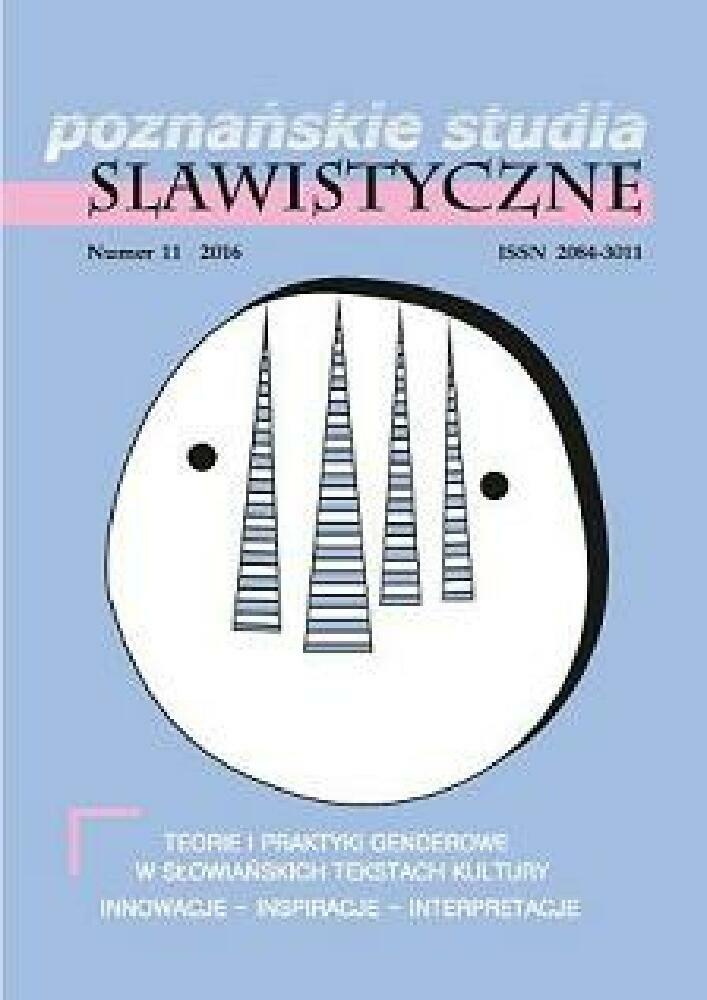Abstract
The aim of this paper, is to try to use feminist and gender theories to read Slavic cultural material, as well as to complete the picture of diversity of Slavic gender orders. For this purpose, the paper focuses on biographies written by Renáta Tyršová devoted to her father and husband. The analysis of this case requires using the feminist criticism of autobiography theory, which is hardly theoretically absorbed within Slavistics. Article seeks to explore the complexities of the relationship between female individual autobiographical “self”, structure of female gender in the bourgeois society of the 19th century, and finally collective idea of nationalism.References
Cieński A., 2002, Z dziejów pamiętników w Polsce, Opole.
Connerton P., 2012, Jak społeczeństwa pamiętają, Warszawa.
Gilmore L., 1994, Autobiographics. A Feminist Theory of Women’s Self-Representation, Ithaca–London.
Gusdorf G., 2009, Warunki i ograniczenia autobiografii, w: Autobiografia, red. M. Czermińska, Gdańsk, s. 19–46.
Jelinek E.C., 1980, Women’s Authobiography: Essays in Criticism, Bloomington.
Krásnohorská E., 1920, Z mého mládí. Vzpomínky životopisné, Praha.
Lejeune Ph., 2001, Wariacje na temat pewnego paktu, red. R. Lubas-Bartoszyńska, Kraków.
Mason M.G., 2009, Inny głos: autobiografie pisarek, w: Autobiografia, red. M. Czermińska, Gdańsk, s. 169–208.
Misch G., 1969, Von der Renaissance bis zu den autobiographischen Hauptwerken des 18. und 19. Jahrhunderts, Frankfurt am Mein.
Pascal R., 1960, Design and Truth in Autobiography, London.
Pekaniec A., 2014, Kobieca literatura dokumentu osobistego, „Women Online Writing” nr 3, s. 80–94, <http://www.womenonlinewriting.org/uploads/3/0/9/9/30990955/8._anna_pekaniec_article2.pdf>, 17.02.2015.
Smith S., Watson J., 1998, Introduction: Situating Subjectivity in Women’s Autobiographical Practices, w: Women, Biography, Theory. A Reader, red. S. Smith, J. Watson, Madison.
Soukupová K., 2015, Autobiografie žánr a jeho hranice, „Česká literatura” nr 1, s. 49–72.
Spengemann W.C., 1980, The Forms of Authobiography. Episodes in the History of Literary Genre, New Haven–London.
Světlá K., 1901, Upomínky, Praha.
Štěpánová I., 2005, Renáta Tyršová, Praha–Litomyšl.
Tyršová R., 1924, Jindřich Fügner. Paměti a vzpomínky na mého otce. Díl 1., Praha.
Tyršová R., 1926, Jindřich Fügner. Paměti a vzpomínky na mého otce. Díl 2., Praha.
Tyršová R., 1932a, Miroslav Tyrš. Jeho osobnost a dílo. Díl 1., Praha.
Tyršová R., 1932b, Miroslav Tyrš. Jeho osobnost a dílo. Díl 2., Praha.
Tyršová R., 1934, Miroslav Tyrš. Jeho osobnost a dílo. Díl 3., Praha.
License
Copyright (c) 2016 Marcin Filipowicz

This work is licensed under a Creative Commons Attribution-NoDerivatives 4.0 International License.
